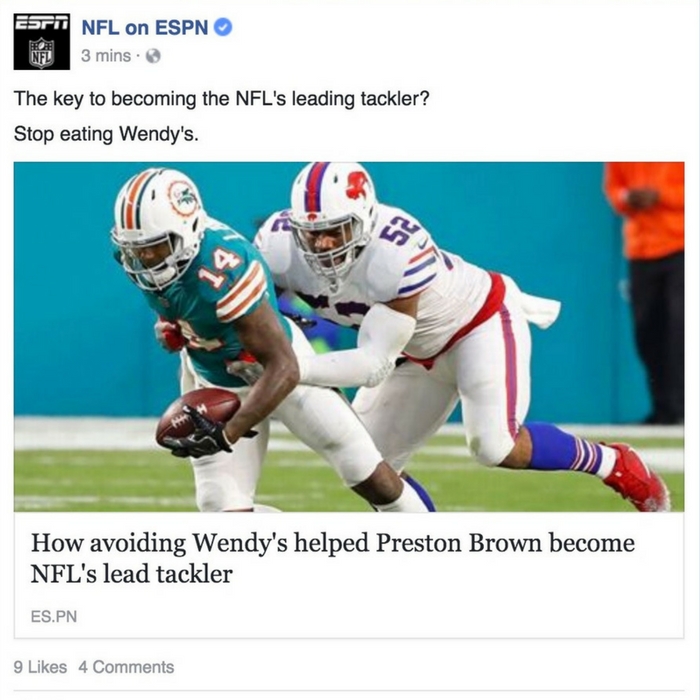ESPN accused of significantly altering headline to appease advertiser
When ESPN’s business interests clash with its reporting, don’t count on the journalism side coming out on top.
According to a report from Deadspin’s Patrick Redford, the “Worldwide Leader” got in a bunch of hot water with its sponsors for running stories derogatory to the brands that pay for ad space on the network, and editorial, under pressure from sales, altered headlines and killed stories.
Depending on your perspective, this is either smart business practice or an unforgivable dissolution of the normally church-and-state-like barrier between the commercial and editorial sides of a media business.
The latest controversy involves ESPN running a story with the headline “How avoiding Wendy’s helped Preston Brown become NFL’s lead tackler,” artifacts of which can still be seen in the article’s URL.

However, sometime since then, ESPN quietly altered the headline of the Mike Rodak piece to read “How a diet helped turn Preston Brown into NFL’s leading tackler” instead. “A diet,” of course, being neutral and not disparaging a brand that is a major ESPN advertising partner, especially as the keystone sponsor of ESPN’s Wooden Award (college basketball’s version of football’s Heisman Trophy) presentation show since 2012.
Internal emails within ESPN show that Wendy’s took umbrage at the perceived dig at its food, especially in something as visible as (since-deleted) tweets and Facebook posts containing the headline, and threatened to pull its sponsorships if ESPN did not alter the headline.
Rodak did not comment on his role in the article, especially since it’s not his responsibility. He wrote a story about how a guy lost weight and got in shape, and it was Brown’s words, not Rodak’s, that cast Wendy’s in the negative light.
The article itself mentions Wendy’s as just one part of an examination of Brown’s overall improved fitness; it fell to the headline writer to turn it into the focus of the social media marketing of the piece, the hook that got people to read it.
An ESPN representative, asked for clarification by Deadspin, said simply that the change was a case of “simple editing. Brown cites multiple reasons he lost weight in the article, and after it posted, an editor read it and thought singling out a single reason didn’t accurately represent the reporting.”
Wendy’s declined to comment.
This isn’t the first time ESPN has faced pressure from one of its corporate partners; it got into deep hot sauce with Buffalo Wild Wings in 2016.
When Packers tight end Jared Cook found a chicken head in his order from B-Dubs, ESPN’s sales department tried to get that article killed as well, but in that case, the newsworthiness of the story was judged to be significant enough and the optics of killing it suspicious enough that it was allowed to stand.
One sales rep said bluntly to editorial, “They spend a lot of money with us….can we avoid this?”
Said another, “Can we make sure we don’t use this … they’re a big spender with us. This is truly nasty, but may hurt us with an important client.”
In that particular case, it was entirely internal; Buffalo Wild Wings had no direct input into the decision.
And it’s with that story that ESPN lost the benefit of the doubt. When sales starts trying to control what content gets published, what you’ve got there is a breach of journalistic ethics that can undermine the credibility of an entire news organization.
Interesting, as I’m positive the NFL, NBA,MLB, and NHL all spend a ron of money on ESPN. If they are willing to alter headlines or bury photographs for Wendy’s and BW’s, what have they done for the Big Four?
— Jaysen Fredriksen (@jaymoneysignen) February 16, 2018
Which is one reason ESPN is in so much trouble: Much of the sports-viewing public just doesn’t trust it anymore.
Truth and Accuracy
We are committed to truth and accuracy in all of our journalism. Read our editorial standards.
Advertise with The Western Journal and reach millions of highly engaged readers, while supporting our work. Advertise Today.











